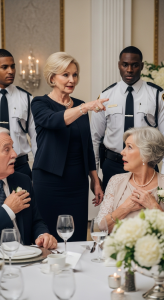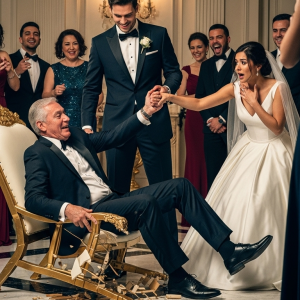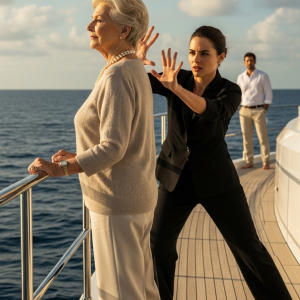The wedding day was supposed to be a flawless tapestry of joy, a seamless union of two families. Instead, it became a stage for a breathtaking display of arrogance and a profound lesson in the true meaning of wealth. I am Katie, and my wedding to Daniel was the beautiful beginning of my life, but it was also the dramatic end of my mother-in-law Rosie’s reign of terror. She tried to humiliate my parents, Jim and Susan, for not “chipping in,” but what unfolded next was a masterclass in quiet dignity and a devastatingly public unraveling of her own pride.
The grand ballroom was a dream made real. Ivory fabric cascaded from the ceilings, crystal chandeliers sparkled like captured starlight, and the scent of peonies and roses filled the air with a delicate fragrance. I stood with Daniel, my heart a drum against my ribs, ready to pledge forever. My parents, Jim and Susan, sat in the front row, their faces alight with an unmistakable pride. They had poured a lifetime of love and effort into me, not just with money, but with their time and their hands. My dad, with his grease-stained hands from years in the garage, had personally tuned up our getaway car. My mom, a whiz with a needle and thread, had spent late nights adding intricate finishing touches to the lace on my dress. Their contributions were priceless, not measured in dollars, but in love.
Then, the soft clink of a silver spoon against a crystal glass cut through the gentle murmur of the crowd. The sound was Rosie’s signature, a prelude to a performance. She stood, resplendent in a burgundy silk dress that seemed to almost vibrate with self-satisfaction. A too-sweet smile played on her lips, a smile I knew meant trouble. Daniel, sensing the coming storm, whispered, “Mom, please don’t…” But it was too late. Rosie was already lost in her own script.
“If I might have everyone’s attention,” she began, her voice dripping with artificial sweetness. Every head turned, and a hush fell over the room. Rosie’s gaze, cold and direct, landed squarely on my parents. “I find it remarkable that some guests believe they can simply attend a celebration to which they contributed absolutely nothing.” The words hit the air like a poisoned dart. My mother’s face went white, her hand flying to her mouth. My father’s grip on his napkin tightened, his knuckles turning bone-white. They were being publicly shamed at their only daughter’s wedding.
Rosie paused, savoring the moment, basking in the stunned silence. She lifted her champagne flute higher, a scepter of her imagined power. “Since my family has generously covered the entire cost of this wedding—from the venue to the cake to every last rose petal—I believe it’s only fair that those who did not help foot the bill should remove themselves from the premises.” She gestured toward my parents, a dismissive wave of her hand. The demand was unthinkable, a grotesque violation of a sacred day. My parents were being ordered to leave. I felt a cold wave of shock, my body frozen in disbelief.
My parents were statues, trapped in a moment of pure shock. My mom’s mouth opened and closed soundlessly, and my dad’s fork clattered to the floor, the sound echoing through the room. I wanted to run to them, to shield them from the cruelty of this woman, but I was paralyzed. Daniel, my new husband, was the first to react. He rose to his feet, his face a mask of anger and humiliation. “Mom,” he said, his voice low and trembling with rage, “this is our day. Please stop.” But Rosie was beyond reason. She was blinded by her own vindictive pride, fueled by the illusion of her superiority.
I braced myself for the inevitable. I expected to see my parents, wounded and defeated, rise from their seats and quietly leave. But what happened next was a moment of grace that would forever be etched in my memory. My father, Jim, stood up slowly. He smoothed the creases from his suit jacket, a quiet, deliberate movement that conveyed an incredible sense of calm. He looked at Rosie, not with anger, but with a serene resolve. “You’re absolutely correct, Rosie,” he said, his voice soft but clear enough for everyone to hear. “We didn’t pay for the wedding. So yes, we will step out.” My heart plummeted. But then he added, “But before we do…” He paused, his steady gaze holding Rosie’s. “There’s just one more thing we’d like to say.”
Rosie’s lip curled in a smug, victorious sneer. “By all means, Jim,” she drawled, her tone dripping with condescension. “Make your point.” My father reached into the inner pocket of his jacket and produced a worn, unassuming envelope. He held it up as if it were the most precious trophy in the world. “You see,” he said, his voice gaining a quiet power, “Susan and I have been planning for your future, Daniel, for a very long time. We chose to focus on your life together rather than impressing our peers with a lavish party.”
With deliberate care, he withdrew a heavy set of keys attached to a brass keyring and a folded scroll of paper. He smiled, a genuine, loving smile, and handed them to Daniel. “This,” he said, his voice now a powerful and emotional declaration, “is the deed to your first home—paid in full, purchased three months ago. A place for you and Katie to build your life. We saved every bonus, every overtime dollar, and every birthday gift in order to give this to you.” A wave of astonished gasps swept through the ballroom. Waiters froze, their trays of hors d’oeuvres forgotten. The string quartet, mid-note, fell silent. Rosie’s eyes bulged, the color draining from her face as the profound truth of the moment hit her. My parents had quietly secured our future while she was publicly boasting about paying for a single day.
Tears streamed down my cheeks as my mother rose and took my hand. “We’ve always believed in giving our children a strong foundation,” she said, her voice shaking but clear and proud. “We never expected a thank-you speech—we just wanted you to have security.” The air was thick with a collective gasp of realization and admiration. Rosie’s friends, the very socialites she had been trying to impress, now looked at her with a mixture of disgust and disbelief. She opened her mouth, then closed it, the words caught in her throat. Her elaborate display of power had been utterly dismantled by a simple act of genuine, selfless love.
Rosie, seeing the judgment in the eyes of everyone around her, clutched her champagne glass and swept past the rows of guests. The heavy double doors at the back of the room slammed behind her, a final, dramatic punctuation to her public disgrace. The stunned silence lasted for a moment longer, then erupted into thunderous applause. Daniel and I held each other, surrounded by the people who truly mattered. My parents were instantly swarmed by family and friends, their generosity and quiet strength celebrated. I buried my face in my dad’s shoulder, whispering, “I’m so proud of you.” He kissed the top of my head, a silent acknowledgment of our shared understanding.
That’s when Daniel’s father, Philip, who had been noticeably absent from the confrontation, stepped forward. He placed a gentle hand on Rosie’s empty chair. “She promised she’d cover everything,” he said, his voice low enough for only us to hear. “That’s how she told the board of directors she’d earn her spot on the club committee. But I was the one who quietly handled the wedding expenses in her place—while still paying alimony for years.” The shockwave of this revelation rippled through Rosie’s inner circle. The very socialites who had envied her lavish gestures now realized she had been living a lie, funding her grandiosity with Philip’s money and undermining her own son’s family all along.
With Rosie gone, the party resumed with a renewed spirit of joyous relief. The string quartet began playing our chosen first dance, and Daniel spun me around the floor under the soft glow of candlelight. We laughed until tears streamed down our faces, surrounded by the people who truly mattered. My cousin Miranda joked, “I hear the Garden Club meeting tomorrow is going to be very dull without Rosie’s directives.” My Aunt Amy tapped me on the shoulder, “Sweetheart,” she said, “I think your parents deserve a dance or two.” Every time my parents glanced at each other, their smiles were radiant with vindication and a love that had stood tall against the storm. They had shown grace under fire and reminded everyone that generosity and loyalty are worth far more than the flashiest bill.
Later that night, as the last guests departed and the staff cleared the tables, Daniel and I sat on a quiet balcony, overlooking the twinkling lights of the reception tent. He wrapped his arm around me, and the weight of his love felt like a tangible, comforting presence. “Your parents are incredible,” he whispered. “I knew they’d come through.” I leaned into him. “They always do. They taught me that kindness and hard work build a life, not big wallets or designer gowns.” Philip joined us with two glasses of champagne. “Here’s to building that life,” he toasted. “And to families that stand together.”

The next morning, from the window of our new home—an elegant townhouse just three doors down from the country club—Daniel and I watched the sun rise over a fresh chapter in our lives. The Hendersons, longtime neighbors who sold us the house at a bargain, waved from their porch, a quiet acknowledgment of the victory we had won. Even that small moment felt sweet. Later, Mom and Dad stopped by with fresh coffee and a homemade key basket for the entryway. Mom winked and said, “We hope you’ll make many happy memories here.” Dad grinned. “Just don’t forget to invite us to the first barbecue.” I realized that day that wedding cakes and centerpieces don’t create memories—people do. And no amount of money could ever replace the love and support of a family who stands by you no matter what, a family who chose to give a home rather than a party.
The scandal of the wedding was the talk of the town for weeks, a story that spread through the exclusive circles of the country club like wildfire. Rosie became a pariah, ostracized by the very people whose approval she craved. Her attempts to spin the narrative fell flat; the truth of my parents’ quiet generosity and Philip’s admission of her deceit was too powerful to be ignored. She tried to attend a few social functions, her head held high, but the cold shoulders and whispered judgments were too much. She eventually retreated from the social scene, her carefully constructed world of status and pretense shattered. The club committee position she had so desperately sought was given to someone else.
In contrast, my parents were hailed as local heroes. People from their own circles, who had known them as hardworking, humble people, spoke of their selfless act with awe. The story of their quiet gift was an inspiration, a reminder that true class is not about what you display, but what you give. Our story, once a private affair, was now a public testament to the power of family and the emptiness of materialism. Daniel and I were humbled and grateful, and we made a silent promise to ourselves to live a life that honored their sacrifice.
Our new home was a haven, a quiet sanctuary from the storm. It wasn’t a sprawling mansion, but it was perfect for us. We spent our weekends painting the walls, laying down new flooring, and choosing furniture together. Every hammer stroke, every can of paint, felt like an act of building our future, brick by brick. We hosted a small housewarming party, just close friends and family, and the air was filled with genuine warmth and laughter. My mom brought her famous lasagna, and my dad grilled steaks on our new patio. The day was simple and beautiful, a true celebration of our new life, far removed from the pomp and circumstance of the wedding.
Daniel’s relationship with his father, Philip, also grew stronger. Philip, freed from the years of Rosie’s manipulation and control, seemed like a different man. He was calmer, more open, and genuinely happy for us. He would stop by on Sundays for coffee, and we would talk for hours about everything and nothing. He told us stories about his own life, about his struggles and his triumphs, and we saw a side of him we had never known. He had always been a quiet presence, but now, he was a true father, a source of love and wisdom.
We learned to navigate our new life with a quiet confidence. The “scandal,” once a source of pain, became a part of our story, a reminder of the lessons we had learned. We became more discerning in our friendships, choosing people who valued us for who we were, not for what we had. We embraced a simpler way of living, finding joy in small moments: a quiet evening on our porch, a walk through the neighborhood, a shared laugh over a silly movie. Our love story wasn’t just about a boy and a girl meeting and getting married; it was about two families, and one man’s dignity, a woman’s greed, and a young couple’s journey to define their own happiness.
A year later, on the anniversary of our wedding, we held a small dinner at our home. My parents, Jim and Susan, were there, as was Philip. We toasted with a bottle of champagne, but this time, the toast was different. It wasn’t about a lavish party or a public display of wealth. It was a toast to family, to resilience, and to the power of love. We had weathered a storm and emerged stronger and more united than ever. We had learned that the true foundation of a home is not a deed, but the unwavering support of the people who love you. And we had learned that the most priceless gift of all is the one that is given with a quiet heart and no expectation of return.




